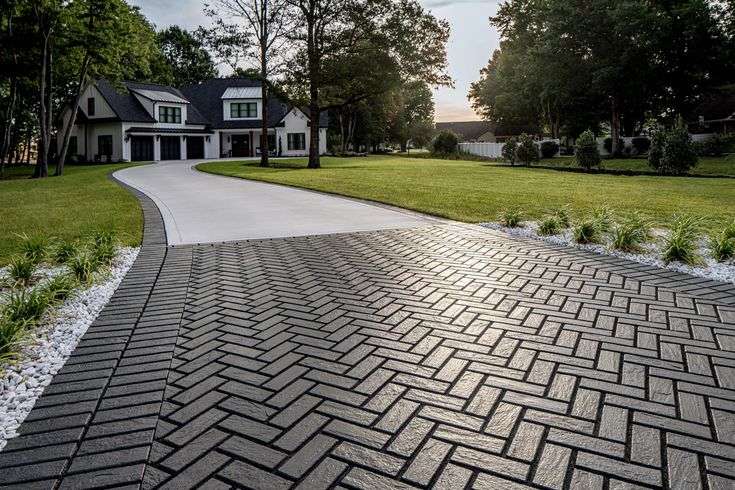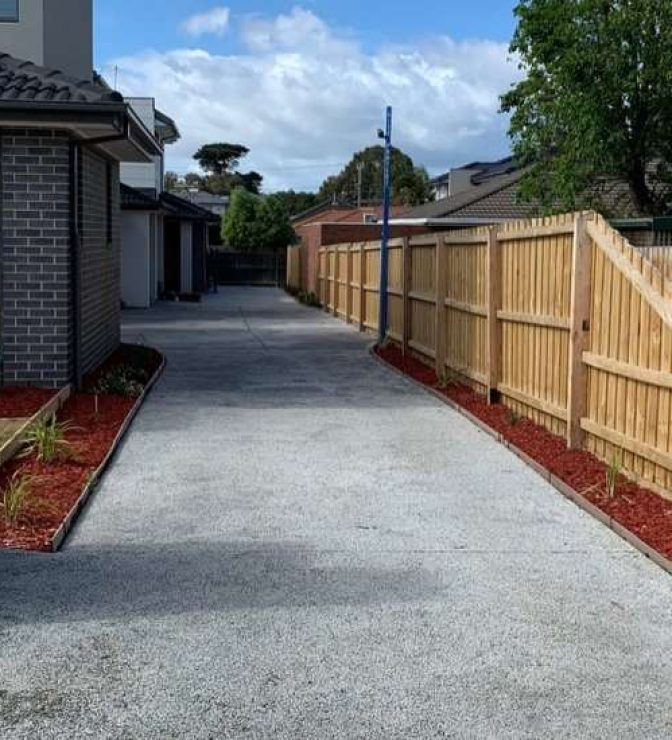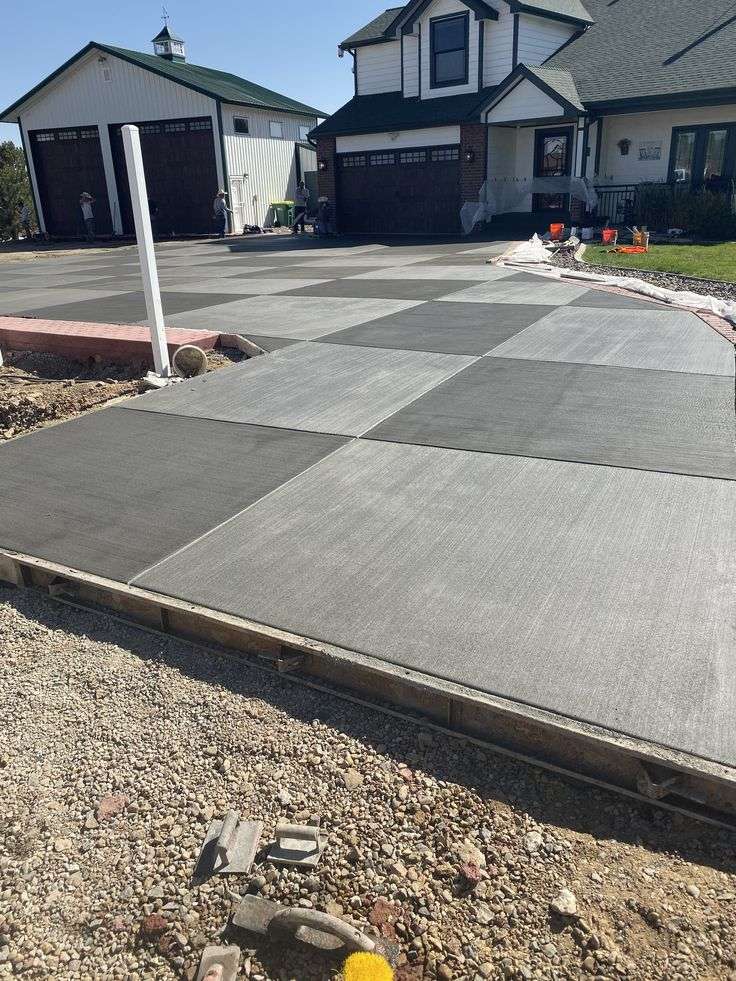
Concrete driveways are a crucial component of any home, providing both functionality and aesthetic appeal.
As experienced concrete contractors, we’ve handled countless projects across Geelong, from residential driveways to commercial pathways.
In this article, we’ll delve into the most common questions we receive about concrete driveways, providing in depth, practical answers to help you make informed decisions.
Table of Contents
- Understanding Cracks in Concrete Driveways
- The Importance of Sealing Your Driveway
- Choosing the Best Material for Your Driveway
- Using Sealers on Concrete Driveways
- Impact of Sealers on Surrounding Grass
- When to Replace Your Driveway

1. Understanding Cracks in Concrete Driveways
Concrete driveways can crack due to several factors, including temperature fluctuations, tree roots, and the weight of heavy vehicles.
Temperature Fluctuations
In Geelong, seasonal changes can cause concrete to expand and contract.
This movement can create stress within the concrete, leading to surface and structural cracks.
Using control joints during installation can help manage this natural expansion and contraction.
Tree Roots
Tree roots grow underneath driveways and can push up sections of concrete.
This movement results in uneven surfaces and visible cracks.
Proper planning, such as positioning driveways away from large trees or installing root barriers, can mitigate this issue.
Weight of Heavy Vehicles
Repeated pressure from heavy vehicles, such as trucks or caravans, can weaken the concrete.
Over time, the load may cause stress fractures or more extensive cracking.
Choosing reinforced concrete or increasing thickness in high-load areas can help prevent damage.
2. The Importance of Sealing Your Driveway
Sealing your concrete driveway is essential to prevent water infiltration, chemical spills, and general wear and tear.
Water Infiltration
Unsealed concrete absorbs water, which can weaken its structure over time.
During colder months, trapped moisture can expand and cause cracks through freeze-thaw cycles.
A quality sealer prevents water penetration and extends the driveway’s lifespan.
Chemical and Oil Spills
Car fluids, such as oil and petrol, can stain unsealed concrete, leading to permanent discolouration.
Sealers create a protective barrier, making spills easier to clean and reducing long-term damage.
Protection Against Harsh Weather
Geelong experiences varied weather conditions, including heavy rains and high temperatures.
A durable sealant protects against weather-related deterioration, preventing premature wear.
3. Choosing the Best Material for Your Driveway
When selecting a material for your driveway, consider factors such as durability, cost, and maintenance.
Concrete
Offers strength and longevity, making it a preferred choice for many homeowners in Geelong.
Can be customised with decorative finishes such as exposed aggregate, coloured concrete, or stamped patterns.
Asphalt
More affordable upfront but requires regular maintenance and resealing.
Absorbs heat, which can lead to softening in extreme temperatures.
Pavers
Aesthetic and versatile option, allowing for creative designs.
More labour-intensive to install and requires periodic maintenance to prevent shifting or weed growth.
4. Using Sealers on Concrete Driveways
Applying a sealer to your concrete driveway can significantly enhance its appearance and durability.
Stain Resistance
Sealers prevent oil, grease, and dirt from penetrating the concrete, making cleaning easier.
Moisture Protection
Reduces the risk of water damage and freeze-thaw cracking.
UV Protection
Prevents colour fading from prolonged sun exposure, which is particularly beneficial for decorative or coloured concrete.
Application Tips
Choose a high-quality sealer designed for outdoor concrete surfaces.
Apply during dry weather conditions to ensure proper adhesion.
Reapply every few years for optimal protection.
5. Impact of Sealers on Surrounding Grass
A common concern is whether driveway sealers can harm surrounding grass.
Sealer Composition
Most modern sealers are formulated to be environmentally friendly and non-toxic.
However, some solvent-based sealers can be harmful if over-applied or allowed to runoff onto lawns.
Application Best Practices
Use a precise application method, such as a roller or controlled spray, to prevent overspray.
Apply sealers on a windless day to reduce the risk of spreading onto vegetation.
Place a protective barrier, such as plastic sheeting, along the edges of the driveway to shield nearby plants.
6. When to Replace Your Driveway
Determining when to replace your driveway depends on its condition and age.
Extensive Cracking
Small surface cracks can often be repaired, but deep or widespread cracks indicate underlying structural issues.
If cracks continue to worsen despite maintenance, replacement may be necessary.
Significant Sinking or Heaving
Driveways may settle over time due to soil movement, causing uneven surfaces.
In severe cases, re-levelling or complete replacement is required to ensure safety.
Widespread Surface Damage
If large sections of concrete are spalling (flaking or chipping), this may indicate material failure.
A new driveway installation will restore functionality and improve the property’s appearance.
Age of the Driveway
Well-maintained concrete driveways typically last 20-30 years.
If your driveway is approaching this age and showing signs of deterioration, replacement might be the best option.

Why Choose Our Concrete Services?
- Expertise and Experience: With years of experience in residential and commercial concreting, we provide top-quality workmanship.
- Quality Materials: We use only the best materials to ensure durability and longevity.
- Custom Solutions: Our services are tailored to meet your specific needs and preferences.
- Professional Service: We pride ourselves on our professionalism and commitment to customer satisfaction.
- Local Knowledge: Being based in Geelong, we understand the unique requirements of the local climate and environment.
For more details or to request a free quote, please contact us today. Let us help you create the perfect concrete driveway for your home.
FAQs
Concrete driveways crack due to factors like weather changes, soil movement, heavy loads, and improper installation. Over time, temperature fluctuations cause the concrete to expand and contract, leading to stress fractures. If the ground beneath the driveway shifts or wasn’t compacted properly before pouring, cracks can form. While some minor cracking is normal, proper reinforcement and sealing can help prevent major damage. Regular maintenance also plays a key role in keeping your driveway in great shape for years to come.
It’s best to seal your concrete driveway every two to three years to protect it from water damage, stains, and general wear and tear. However, the exact timing depends on the climate, the amount of traffic, and the type of sealer used. If you notice the surface looking dull, absorbing water quickly, or showing signs of minor cracks, it’s a good sign it needs sealing. Keeping up with this maintenance will help extend the life of your driveway and keep it looking fresh. Regular sealing also prevents damage from oil spills, UV rays, and harsh weather conditions.
In Geelong, concrete is one of the best materials for a driveway due to its durability, affordability, and ability to withstand the local climate. Exposed aggregate concrete is particularly popular because it offers a stylish finish, is slip-resistant, and requires minimal maintenance. Asphalt can be a good alternative for a smoother, more budget-friendly option, while pavers provide a high-end look with flexibility for repairs. However, concrete remains a top choice because it lasts for decades with proper care and suits a wide range of home styles. Whether you prefer a plain, coloured, or decorative finish, concrete driveways provide excellent value for money.
You can apply a sealer yourself, but hiring a professional is often the better choice for a longer-lasting and more even finish. A professional will ensure the surface is properly prepared, use high-quality sealing products, and apply the sealer correctly to prevent streaks or bubbles. If you decide to do it yourself, make sure to thoroughly clean the driveway and follow all application instructions carefully. It’s important to choose the right type of sealer for your driveway to get the best results. While a DIY job can save money upfront, a professional application can offer better protection and a more polished look.
Driveway sealer won’t directly damage your lawn, but if it splashes onto grass or plants, it can cause discolouration or stress. To prevent any issues, it’s a good idea to cover nearby grass and garden beds with plastic sheeting while sealing the driveway. If any sealer does get onto your lawn, rinsing it off quickly with water can help minimise any potential damage. Choosing a water-based sealer can also reduce the risk of harming your plants. With a little care and preparation, you can protect your driveway without affecting your landscaping.
If your driveway has large cracks, deep potholes, or an uneven surface that creates drainage issues, it may be time for a replacement. Small cracks can often be repaired, but if they keep spreading or the driveway is significantly worn down, patching it up might not be enough. Signs like crumbling edges, frequent repairs, or a surface that no longer holds up to traffic are good indicators that a full replacement is needed. A new driveway can improve both the safety and appearance of your home while adding value to your property. Getting a professional assessment can help you decide whether repairs or a replacement is the better option.
Concrete driveways offer several advantages over other materials, making them a great long-term investment. They are extremely durable, requiring less maintenance than gravel or asphalt while lasting for decades. Unlike pavers, concrete driveways don’t shift over time, reducing the risk of uneven surfaces and weeds growing through the cracks. They can also be customised with decorative finishes like exposed aggregate or coloured concrete, giving your home a modern and stylish touch. Plus, with their strength and resilience, concrete driveways can handle heavy vehicles and all kinds of weather conditions, making them a practical and cost-effective choice.

